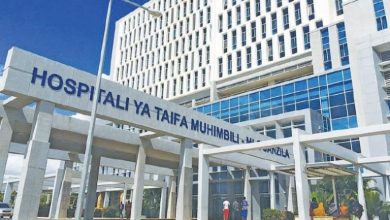Africa CDC, Novo Nordisk partner with 5bn/- grant for NCDs surveillance

NEW YORK: THE Africa Centres for Disease Control and Prevention (Africa CDC) has partnered with the Novo Nordisk Foundation to strengthen public health workforce capacity for Non-Communicable Disease (NCDs) surveillance across ten African Union (AU) Member States.
According to the Director-General of Africa CDC, Dr Jean Kaseya, non-communicable diseases are rising rapidly across continent, yet surveillance systems remain weak so the Novo Nordisk Foundation has awarded a grant of more than 5bn/- (2.65m US dollars) towards the initiative from June 2025 up to 2027, and the Africa Public Health Foundation (APHF) will act as fund manager for the grant.
“ This partnership with the Novo Nordisk Foundation comes at a critical time to equip our health workforce with the tools, skills, and systems needed to generate reliable data. Strengthening NCD surveillance is essential for evidence-based decision-making, smarter investments, and building resilient health systems that protect all Africans. This initiative is a cornerstone of Africa CDC’s strategy to advance health sovereignty and a new public health order for Africa,” he said.
Adding, he said, “The Novo Nordisk Foundation is committed to accelerating NCD prevention and care, focusing among other things on the health workforce, and we are pleased to enter into a partnership with Africa CDC, which is a key actor in strengthening health systems across the African Union, says Professor Flemming Konradsen, Chief Scientific Officer, Health, Novo Nordisk Foundation. “This project will enable better planning and policy making for NCD prevention and care through systematic collection of data on disease burden, risk factors and health service utilization.”
Dk Kaseya addresses that the project is building on Africa CDC’s NCDs, Injuries Prevention and Control, and Mental Health Promotion Strategy (2022–2026) and the 2024 Guidance for Strengthening NCD Surveillance Systems. It will integrate an NCD surveillance pillar into the existing Field Epidemiology Training Program (FETP) frontline course.
“By embedding NCD indicators into existing health information systems at all levels of care, this program will enhance evidence-based decision-making, foster cross-country peer learning, and contribute to building a new public health order in Africa that prioritizes prevention, resilience, and stronger health systems.
He said that though the focus of public health policymakers in Africa is overwhelmingly on communicable diseases, premature deaths and disability from NCDs and mental health conditions, and their overall share of the disease burden, is increasing rapidly.
“The burden of NCDs in sub-Saharan Africa alone grew by 67 percent between 1990 and 2017, reflecting a significant rise in the proportion of total Disability Adjusted Life Years (DALYs) attributable to NCDs from 18percent to 30 percent. Projections indicate that NCDs & injuries and mental health conditions will cause more premature deaths on the continent than all other conditions combined by 2030 and, by far, most deaths and disability by 2063,” he said.
He explain that despite the need for and the importance of reliable data to inform policies and planning, public health surveillance systems are still fragile in most African countries. There is limited regular population-based data for NCDs, their risk factors and determinants, which affect the decisions made to address these conditions including their prioritization and integration into primary and secondary health care levels.
“In 2022, Africa CDC developed and launched its first continental strategy on NCDs, which calls for investments in strengthening the workforce and developing/strengthening integrated systems, including surveillance systems for NCD prevention and control on the continent.
As part of scaling up the implementation of this strategy, in 2024, Africa CDC developed and launched a Guidance for strengthening NCDs, injuries and mental health Surveillance Systems in member states, with recommendations on indicator development, data collection, data analysis and use, multisectoral coordination, and integration of NCD indicators into existing health information systems at all levels of care.
ALSO READ: Dar renews efforts to combat non-communicable diseases
Despite the efforts made by Africa CDC in providing strategic guidance to Member States around NCDs surveillance strengthening, challenges regarding the availability of a strong, skilled workforce to lead the way in the implementation of this guidance persist.
Through this project, Africa CDC will develop a scalable NCDs workforce development program focusing on NCDs surveillance, which will contribute to the achievement of recommendations provided in the above-mentioned guidance, specifically on building the capacity of Member States to collect, analyze, and use NCDs data to inform decisions, as well as integrate NCDs into existing health information systems at all levels of healthcare.
“We are grateful to be the fund managers of this much-needed grant. Non-communicable diseases are a defining public health challenge of our generation, silently devastating families and crippling economies. This generous grant from the Novo Nordisk Foundation is more than funding. It is a much-needed partnership that will allow us to build a frontline defence, a network of highly skilled health professionals equipped with the data and peer support needed to turn the tide against NCDs,” added Dr. Francisco Songane, the Interim CEO of Africa Public Health Foundation.





